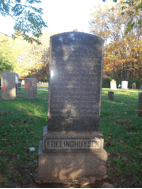The Life of Theodorus Jacobus Frelinghuysen
By Miranda Rockhold

Put your comfiest pajamas on, pull your covers up, and turn on your reading lamp because you are about to read the best bedtime story about the importance of Theodorus Jacobus Frelinghuysen and his contribution to the Great Awakening that will leave you with the holiest of dreams. The Great Awakening took place in colonial British America (what is now considered the East Coast) from the early 1700s to about the 1740s.
Broadly speaking, the Great Awakening created an environment where religious revivals focusing on the Holy Spirit and individual salvation were welcomed and many people began to challenge the views of the Church of England. People had the freedom to choose what they believed and HOW they wanted to believe it. This was one of the first times the members of colonial society were every given an option to choose between one belief or another because they were previously under rule of the British King, who determined what religion they praticed. One of the earliest revivalists and catalysts (think science… the thing that makes the reaction!) of the Great Awakening was Theodorus Jacobus Frelinghuysen… der Mann, der Mythos, die Legende (the man, the myth, the legend).

Lingen, Germany
Born in 1691 in Lingen, Germany, baby Theodorus lived with his mother and his father, pastor of the German Reformed Church. Some could say that Frelinghuysen was genetically destined to start a reformation… even his great grandfather was a reformed church leader. Frelinghuysen grew up in the church, running around theologians and innovative thinkers that sculpted his views of how the church should be run, of God, and of ways to show devotion to God. As a young teenager, Frelinghuysen made the big move to the Netherlands and enrolled in the University of Lingen to study the teachings of Gisbertus Voetius, a theologian of the Dutch Reformed Church, and he also mastered the Dutch language at the University.  Frelinghuysen immersed himself in his studies and learned all about the Dutch Reformed Church from Voetius, who was a believer in the reformed blend of knowledge and piety which was taught in the second Dutch reformation (similar to the Great Awakening… but in the Netherlands). Throughout Frelinghuysen’s time under Voetius’s guidance, Frelinghuysen committed to his teachings of Reformed piety and experiential divinity, testing of the soul (Beeke). Frelinghuysen’s teenage brain was full of divine ideas and he was ready to change the ideas of other people ALL THE WAY IN THE COLONIES. Now your dreams are going to be filled with images of Germany AND the northeastern colonies.
Frelinghuysen immersed himself in his studies and learned all about the Dutch Reformed Church from Voetius, who was a believer in the reformed blend of knowledge and piety which was taught in the second Dutch reformation (similar to the Great Awakening… but in the Netherlands). Throughout Frelinghuysen’s time under Voetius’s guidance, Frelinghuysen committed to his teachings of Reformed piety and experiential divinity, testing of the soul (Beeke). Frelinghuysen’s teenage brain was full of divine ideas and he was ready to change the ideas of other people ALL THE WAY IN THE COLONIES. Now your dreams are going to be filled with images of Germany AND the northeastern colonies.
Frelinghuysen set sail to New York from the Netherlands in September of 1719 along with Jacobus Schuurman, a schoolmaster friend. Upon arrival to New York, Frelinghuysen was appointed to various churches in the Raritan Valley of New Jersey. One of his first public sermons occurred on January 21, 1720 in the Raritan Valley, where he preached his inaugural sermon about 2 Corinthians 5:20 and created a stir among the crowd for his unconventional ideas and preaching style. To the people of the colonies, Theodorus was a foreign man coming to random crowds preaching foreign ideas… although, soon he would have many followers.
One of the main reasons Frelinghuysen’s preaching methods were so effective at spreading his beliefs was because of his vigorous studies under Voetius. He learned about the Dutch Reformation, and he effectively shared those beliefs because he studied and promoted different languages and heart religion (worshipping God from the heart). After getting acclimated with the colonies, Frelinghuysen continued preaching in the Raritan Valley despite his differences with critics. Thomas Kidd (historian and author of the BEST book about the Great Awakening) said it best, “Such preaching clearly helped pave the way for the great Middle Colonies revivalists of the 1740s”.[1] Frelinghuysen’s determination and ability to connect with people allowed the Great Awakening to cultivate piety and practice Dutch Reformation.
Hopefully this doesn’t bring you any nightmares, but Frelinghuysen’s journey of reformation in the colonies came with a few bumps in the road. In Midwood, New York, in 1729, members of Frelinghuysen’s congregation and Reverend Freeman charged Frelinghuysen with preaching false teachings. Throughout the next 18 years, Frelinghuysen experienced extreme criticism from the Classis (governing body of Dutch Reformed churches) of Amsterdam and some people in the colonies because they felt that he unreasonably excommunicated people from the church. In 1729, the Classis of Amsterdam charged Frelinghuysen and ordered him to release the summoned from the ban of excommunication. Around the same time that Frelinghuysen was charged, Frelinghuysen experienced various mental breakdowns from emotional stress from opposition and was diagnosed with mild psychoses, and in the 1700s a mental breakdown was considered being crazy. This didn’t stop Frelinghuysen from pursuing his reformation of the colonies and rapidly recovered from the emotional distress. He continued to preach at various churches and even was the pastor of a few. Finally, in 1738, Frelinghuysen and his critics signed an agreement to end “Years of Bitterness.” No nightmares from this… I promise!
In 1729, the Classis of Amsterdam charged Frelinghuysen and ordered him to release the summoned from the ban of excommunication. Around the same time that Frelinghuysen was charged, Frelinghuysen experienced various mental breakdowns from emotional stress from opposition and was diagnosed with mild psychoses, and in the 1700s a mental breakdown was considered being crazy. This didn’t stop Frelinghuysen from pursuing his reformation of the colonies and rapidly recovered from the emotional distress. He continued to preach at various churches and even was the pastor of a few. Finally, in 1738, Frelinghuysen and his critics signed an agreement to end “Years of Bitterness.” No nightmares from this… I promise!

Frelinghuysen’s Grave
In 1745, the last church that Frelinghuysen was appointed in (before his peaceful death) was in Albany, New York. He preached from 1745 all the way until his death in 1747 in Franklin Township, New Jersey. Throughout his lifetime, Frelinghuysen proudly spread the teachings of the Dutch Reformed Church and even preached at churches that are still around today. Frelinghuysen lived a life educating others on the Dutch Reformed Church and inspiring other people to start reformations of their own in the colonies. I hope you enjoyed your bedtime story and will dream of Frelinghuysen sermons and wake up feeling enlightened and educated!
For further readings about Theodorus Jacobus Frelinghuysen, check out these sources!
- Beeke, Joel R. Forerunner of the Great Awakening: Sermons by Theodorus Jacobus Frelinghuysen. N.p.: Eerdmans, 2000. Print.
- Kidd, Thomas S. The Great Awakening: The Roots of Evangelical Christianity in Colonial America. N.p.: Yale UP, 2007. Print.
- Loux, Joseph Anthony. Boel’s Complaint Against Frelinghuisen. Hamilton Printing Company, 1979.
- VandenBerge, Peter N. Historical Directory of the Reformed Church in America, 1628-1978. Eerdmans, 1978.
[1] Kidd, Thomas S. The Great Awakening: The Roots of Evangelical Christianity in Colonial America. N.p.: Yale UP, 2007. Print.
